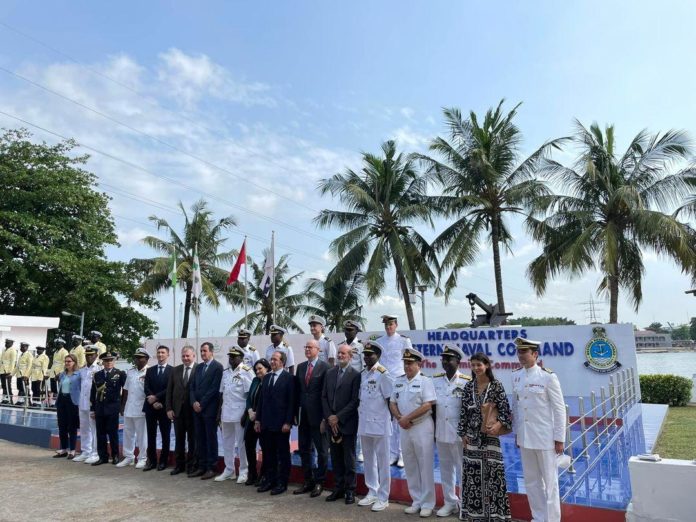[Source: EU Delegation to Nigeria and ECOWAS] Top Nigerian naval and government officials met with their European Union counterparts in Lagos on April 7 to solidify a partnership aimed at tightening the security around the Gulf of Guinea, one of the world’s most notorious pirates hotspots. The Gulf of Guinea stretches from Senegal to Angola, covering approximately 2,874 nautical miles of coastline. The struggle against maritime insecurity along the Gulf of Guinea is a collaborative effort that is beyond the capacity of one country. To enhance this collaboration, the Economic Community of West African States (ECOWAS) joined forces with the Economic Community of Central African States to establish the Yaounde Code of Conduct.
Leading the EU’s side to the first ever Joint Event on Strengthening Nigeria – EU Cooperation on Maritime Security was the Senior Coordinator for Maritime Security in the Gulf of Guinea, Nicolas Berlanga. The Head of the EU Delegation to Nigeria and ECOWAS, Ambassador Samuela Isopi as well as the Ambassadors of Spain (Mr Juan Sell); Italy (Mr Stefano De Leo); Portugal (Mr Luís Barros) and the Deputy Head of the French Mission also attended the event, held Nigerian Navy’s Western Naval Command, Lagos.
The meeting coincided with the port calls from the Italian naval vessel IT RIZZO and the Spanish ES SERVIOLA.
Nigeria’s Chief of naval Staff, Vice Admiral Awwal Gambo, said the significance of the event was underscored by the fact that it was coming at a time that the government was committing itself to the sustainable development of the country’s blue economy.
“A secure maritime environment is a contributing factor to the economic prosperity of nations the world over,” he said.
The struggle against maritime insecurity along the Gulf of Guinea is a collaborative effort that is beyond the capacity of one country. To enhance this collaboration, the Economic Community of West African States (ECOWAS) joined forces with the Economic Community of Central African States to establish the Yaounde Code of Conduct.
Gambo noted that the security partnership goes beyond Africa, embracing the European Union and other key international players geographically outside the Gulf of Guinea. He said the partnership became necessary because the Gulf of Guinea is of global significance as a crucial maritime route.
“It is an important shipping zone, transporting oil and gas as well as goods to and from Africa and the rest of the world.”
At least 1,500 tankers, cargo ships, and fishing vessels navigate through the Gulf of Guinea daily. There are regular cases of piracy; armed robbery at sea; kidnapping of seafarers; illegal, unreported, and unregulated fishing; smuggling; trafficking; and transnational organised crimes.
Gambo said Nigeria’s continued successes in the anti-piracy war have led to the activities of pirates in the Gulf of Guinea, reaching an all-time low in more than a decade.
Read more on the website of the Delegation of the European Union to the Federal Republic of Nigeria

